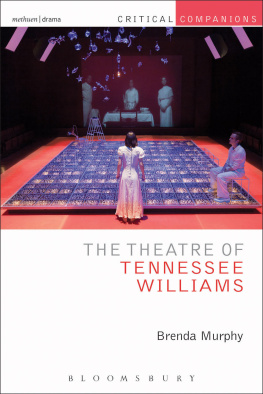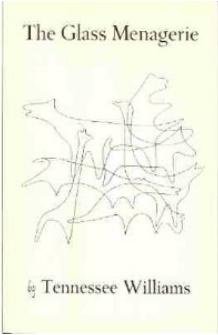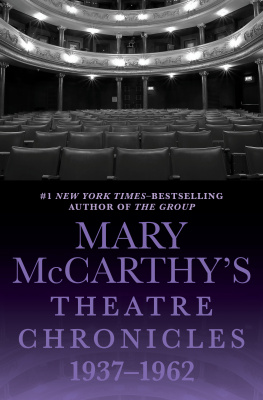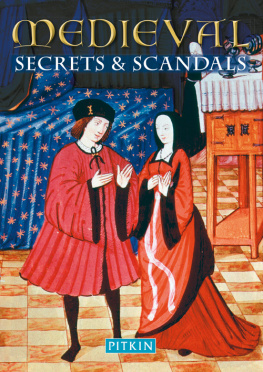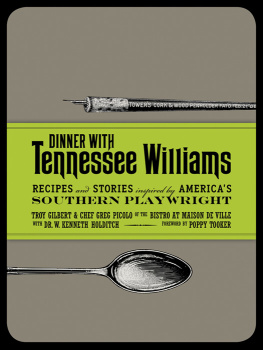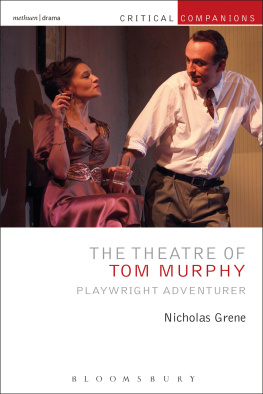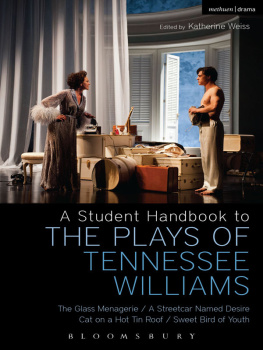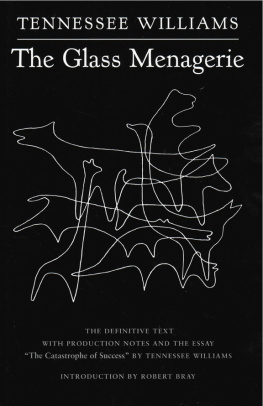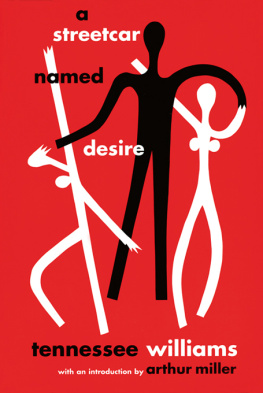Brenda Murphy - The Theatre of Tennessee Williams
Here you can read online Brenda Murphy - The Theatre of Tennessee Williams full text of the book (entire story) in english for free. Download pdf and epub, get meaning, cover and reviews about this ebook. publisher: Bloomsbury Academic, genre: Detective and thriller. Description of the work, (preface) as well as reviews are available. Best literature library LitArk.com created for fans of good reading and offers a wide selection of genres:
Romance novel
Science fiction
Adventure
Detective
Science
History
Home and family
Prose
Art
Politics
Computer
Non-fiction
Religion
Business
Children
Humor
Choose a favorite category and find really read worthwhile books. Enjoy immersion in the world of imagination, feel the emotions of the characters or learn something new for yourself, make an fascinating discovery.
- Book:The Theatre of Tennessee Williams
- Author:
- Publisher:Bloomsbury Academic
- Genre:
- Rating:5 / 5
- Favourites:Add to favourites
- Your mark:
- 100
- 1
- 2
- 3
- 4
- 5
The Theatre of Tennessee Williams: summary, description and annotation
We offer to read an annotation, description, summary or preface (depends on what the author of the book "The Theatre of Tennessee Williams" wrote himself). If you haven't found the necessary information about the book — write in the comments, we will try to find it.
The Theatre of Tennessee Williams — read online for free the complete book (whole text) full work
Below is the text of the book, divided by pages. System saving the place of the last page read, allows you to conveniently read the book "The Theatre of Tennessee Williams" online for free, without having to search again every time where you left off. Put a bookmark, and you can go to the page where you finished reading at any time.
Font size:
Interval:
Bookmark:
THE THEATRE OF TENNESSEE WILLIAMS
Brenda Murphy is Board of Trustees Distinguished Professor of English, Emeritus at the University of Connecticut. Among her 18 books on American drama and theatre are Tennessee Williams and Elia Kazan: A Collaboration in the Theatre (1992), Understanding David Mamet (2011), Congressional Theatre : Dramatizing McCarthyism on Stage, Film, and Television (1999), The Provincetown Players and the Culture of Modernity (2005), and as editor, Critical Insights: Tennessee Williams (2011) and Critical Insights: A Streetcar Named Desire (2010).
In the same series from Bloomsbury Methuen Drama:
THE PLAYS OF SAMUEL BECKETT
by Katherine Weiss
THE THEATRE OF MARTIN CRIMP (SECOND EDITION)
by Aleks Sierz
THE THEATRE OF BRIAN FRIEL
by Christopher Murray
THE THEATRE OF DAVID GREIG
by Clare Wallace
THE THEATRE AND FILMS OF MARTIN MCDONAGH
by Patrick Lonergan
MODERN ASIAN THEATRE AND PERFORMANCE 19002000
Kevin J. Wetmore and Siyuan Liu
THE THEATRE OF SEAN OCASEY
by James Moran
THE THEATRE OF HAROLD PINTER
by Mark Taylor-Batty
THE THEATRE OF TIMBERLAKE WERTENBAKER
by Sophie Bush
Forthcoming:
THE THEATRE OF CARYL CHURCHILL
by R. Darren Gobert
To George
THE THEATRE OF TENNESSEE WILLIAMS
Brenda Murphy
Series Editors: Patrick Lonergan and Erin Hurley

Bloomsbury Methuen Drama
An imprint of Bloomsbury Publishing Plc
| 50 Bedford Square | 1385 Broadway |
| London | New York |
| WC1B 3DP | NY 10018 |
| UK | USA |
www.bloomsbury.com
Bloomsbury is a registered trademark of Bloomsbury Publishing Plc
First published 2014
Brenda Murphy, 2014
All rights reserved. No part of this publication may be reproduced or transmitted in any form or by any means, electronic or mechanical, including photocopying, recording, or any information storage or retrieval system, without prior permission in writing from the publishers.
Brenda Murphy has asserted her right under the Copyright, Designs and Patents Act, 1988, to be identified as author of this work.
No responsibility for loss caused to any individual or organization acting on or refraining from action as a result of the material in this publication can be accepted by Bloomsbury or the author.
British Library Cataloguing-in-Publication Data
A catalogue record for this book is available from the British Library.
ePub ISBN: 978-1-4081-4533-3
Library of Congress Cataloging-in-Publication Data
A catalog record for this book is available from the Library of Congress.
Typeset by Deanta Global Publishing Services, Chennai, India
CONTENTS
Bruce McConachie
John S. Bak
Felicia Hardison Londr
Annette J. Saddik
My heartfelt thanks are due to the libraries and their staffs that made the research for this volume not only possible but also pleasurable: my home library, the Homer Babbidge Library of the University of Connecticut, which provided me with research space as well as help and resources; the Harry Ransom Humanities Research Center at the University of Texas at Austin, which has the richest source for Williams manuscript materials and one of the kindest and most helpful library staffs I have ever encountered; and the Harvard Theatre Collection, Houghton Library, Harvard University, the Rare Book and Manuscript Library of Columbia University, and the Billy Rose Theatre Collection of the New York Public Library for the Performing Arts, all of which provided important material for this study.
I am grateful to Mark Dudgeon at Bloomsbury Methuen Drama and series editor Patrick Lonergan for their invaluable advice and support, and for giving me the opportunity to write this book, which is the result of 30 years of thinking about, writing about, and teaching the works of Tennessee Williams. I would also like to thank my students in two courses on Tennessee Williams at the University of Connecticut in 201112. They inspired me with the sense that Williamss works are exceedingly relevant to life in the twenty-first century and were not only tolerant but enthusiastic as I tried out many of the ideas in this book on them. As always, my husband, George Monteiro, contributed his unique critical acumen at crucial stages and moral support throughout the writing of this book.
The University of the South has granted permission to quote from unpublished manuscripts by Tennessee Williams. Copyright 2013 The University of the South. Reprinted by permission of Georges Borchardt, Inc., on behalf of the University of the South, Estate of Tennessee Williams. All rights reserved.
| C | Devlin, Albert J. (ed.), (Jackson: University Press of Mississippi, 1986). |
| CP | , eds. David Ernest Roessel and Nicholas Rand Moschovakis (New York: New Directions, 2002). |
| CS | (New York: New Directions, 1985). |
| L1 | : Volume I 19201945 , eds. Albert J. Devlin and Nancy M. Tischler (New York: New Directions, 2000). |
| L2 | : Volume II 19451957 , eds. Albert J. Devlin and Nancy M. Tischler (New York: New Directions, 2004). |
| M | (Garden City, NY: Doubleday, 1975). |
| N | , ed. Margaret Bradham Thornton (New Haven: Yale University Press, 2006). |
| NSE | , ed. John S. Bak (New York: New Directions, 2009). |
| P1 | (New York: Library of America, 2000). |
| P2 | (New York: Library of America, 2000). |
| T1-T8 | , 8 Vols (New York: New Directions, 19711992). |
As she tries to explain her son Sebastians life to Dr Cukrowicz in Suddenly Last Summer (1958), Violet Venable says, his life was his work because the work of a poet is the life of a poet.... I mean you cant separate them (P2: 102). This was famously true of Tennessee Williams. From the time when he made the decision to be a playwright and entered the University of Iowas playwriting program in 1937, his life was arranged around writing. His intimate relationships were either short-term liaisons that did not interfere with his work or, as with Frank Merlo and Amado Rodriguez y Gonzales, arrangements in which his partner also served as his secretary, or what would now be known as his personal assistant. This is the way he generally referred to Merlo, with whom he shared an intimate 14-year relationship, outside his close circle of friends, and it was not simply a cover for a gay relationship in the homophobic 1950s. He paid him a salary, and it was well known in Williamss circle that Merlo not only helped with his work, but also ran the household, made the travel arrangements, and generally removed the burdens of everyday life from Williams so he would be free to write without annoyance.
The home in Key West, Florida that Williams shared with Merlo, with its little studio built to his specifications for writing, was his favorite and most productive place to work, but his house in New Orleans and the many apartments and hotel suites he occupied after he could afford something more comfortable than a room at the YMCA were also arranged around his writing. well as both new scenes, sensations and experiences, which stimulated his creative juices, and a quiet place where he could be alone with his typewriter in the mornings.
As described by many observers, Williamss daily writing was obsessive. His longtime friend, director Elia Kazan, remarked that, every morning, no matter where he found himself, what condition he was in from the night before, or whom he was with, he would get out of bed, roll a sheet of paper into his portable typewriter, and become Tennessee Williams. This was his life. During the few periods when he experienced writers block, he suffered from terrible bouts of anxiety which did not subside until he was able to write again. When Dr Lawrence Kubie, with whom he was in analysis in 1957 and 1958, prescribed a hiatus from writing as a way to lie fallow and recharge his creative power, he wrote to Kazan that without his work, he was unbearably lonely and his life unbearably empty (N: 711). He was soon writing again.
Next pageFont size:
Interval:
Bookmark:
Similar books «The Theatre of Tennessee Williams»
Look at similar books to The Theatre of Tennessee Williams. We have selected literature similar in name and meaning in the hope of providing readers with more options to find new, interesting, not yet read works.
Discussion, reviews of the book The Theatre of Tennessee Williams and just readers' own opinions. Leave your comments, write what you think about the work, its meaning or the main characters. Specify what exactly you liked and what you didn't like, and why you think so.

